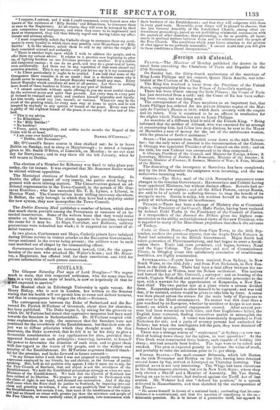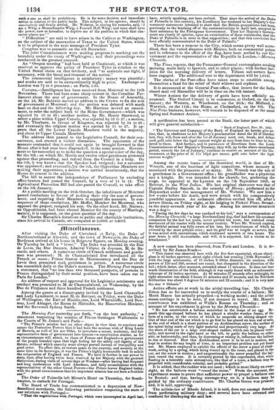goreign ant Tolonial.
FRANCE.—The Mon iteur of Monday published the decree in the usual form convoking the Chambers of Peers and Deputies for the 27th December.
On Sunday last, the thirty-fourth anniversary of the marriage of King Louis Philippe and his consort, Queen Marie Amelie, was cele- brated at the Chateau of St. Cloud.
The King has received a letter from the President of the United States, congratulating him on the Prince of Joinville's marriage. There has been illness among the little Princes : the Count of Paris has just recovered from a cold ; and the Count of Ea has been suffer- ing from croup, but was doing well.
The correspondent of the Times mentions as an important fact, that Louis Philippe has ordered for his private libraries comes of the Mar- quis de Custine's Russia in 1839, which deals severely with the empire and its rulers. This is construed to be an affront in retaliation for the slights which Nicholas has put on Louis Philippe.
An anecdote of a different kind is told of the French King. "Being informed that the mother of Alibaud, who was executed for an attempt at assassinating him, had fallen into deep distress, he sent to the Mayor of Marseilles a sum of money for the use of the unfortunate woman, with the promise of further assistance."
SPAIN.—The accounts from Madrid come down to the 24th Novem- ber ; but the only news of interest is the reconstruction of the Cabinet. S. Olozaga was appointed President of the Council on the 20th; and on the 24th, his new Cabinet was announced to be thus composed— S. Olozaga, President of the Council, and Minister for Foreign Affairs; S. Luzuriaga, Minister of Justice; S. annenech, Minister of the Interior ; S. Cantero, Minister of Finance; S. Serrano, Minister of War ; S. Friss, Minister of the Marine.
The disarming of the insurgents at Barcelona has been completed; and by the 26th November the emigrants were returning, and the ma- nufactories resuming work.
GREECE.—The Malta mail of the 15th November announces some changes in the Grecian Government ; Mavrocordato and Colletti having been appointed Ministers, but without distinct offices. Bavaria had ac- quiesced in the new regime; and all the Allied Powers, except Russia, are said to be of accord in suffering Greece to reap the benefit of its energetic move. Russia is sulky, but confines herself to the negative policy of withdrawing from all interference.
TURREY.—There has been a change of Ministry also at Constanti- nople: the President of the Council, Hafiz Pacha, having been replaced by Achmet Fethi Paella in the Presidency of the Council of Justice. A c zrespondent of the Journal des Debats gives the highest com- mendation to the ability and enlightened views of the new President, who is superior to many of the Mussulman prejudices that check the advance of Turkey.
CAPE OF GOOD ROPE.—Papers from Cape Town, to the 30th Sep- tember, confirm the previous reports, that the Anglo-Dutch Farmers at Natal had submitted to the British Government. Major Smith had taken possession of Pietermaaritzberg, and bad begun to erect a fortifi- cation there. Trade had been permitted, and begun, between Natal and the Cape Colony. The discretion and zeal of Commissioner Cloete, in bringing about this satisfactory conclusion of troublesome hostilities, are highly commended.
A USTRALASIA.— Papers have been received from Sydney, in New South Wales, to the 30th July ; and from Port Nicholson, in New Zea- land, to the 28th June. There had been a fatal affray between the na- tives and British at Wairoa, near the Nelson settlement. The natives had burned the hut of Mr. Cotterell, a surveyor : and on hearing of the attack, Captain Wakefield and several of the colonists proceeded to the spot, with a warrant for the apprehension of Rauparaha, a New Zea- land chief. The two parties met at a place where a stream divided them. Rauparaha refused to allow himself to be captured ; and was told that, if he resisted, orders would be given to take him by force. A canoe was then placed across the stream for the main body of Europeans to pass over to the Maori encampment. No sooner was this done than a gun was fired by an European, whether by accident or design is not men- tioned; on which a general engagement ensued. After several per- sons had been wounded on both sides, and four Englishmen killed, the English force retreated, finding themselves unable to accomplish the object of their mission. A vessel was immediately despatched to Port Nicholson for aid ; and a party of seventy persons had embarked for Nelson ; but when the intelligence left the port, they were detained off Somes's Island by contrary winds. There was a strange source of "excitement" at Sydney—a new me- thod of boiling down sheep for the tallow, in vast quantities !At the Five Dock were constructed three boilers, each capable of holding 500 sheep ; 400 had actually been boiled. The legs were to be salted and smoked. The plan is expected greatly to increase the value of stock, and probably to raise the minimum price to 7s. per sheep.
UNITED STATES.—The mail-steamer Britannia, which left Boston on the 16th November and Halifax on the 19th, having been detained
several hours by fog, arrived at Liverpool on Thursday morning. The political news is not very interesting. The Whigs had been victorious
in the Massachusetts elections, but not in New York State ; where they only elected a Sheriff and a Member of Assembly. Mr. Van Buren, having an eye to reelection, had declared against the Tariff Act of last session. Mr. Webster had also "defined his position," in a speech delivered in Massachusetts, and thus sketched by the correspondent of the Times— Be avows himself in favour of a national bank ; contending that its esta- blishment is constitutional, and that the question of expediency is the °my debateable question. Ile 111 ill favour of a protective tariff, but opposed to au& a one as shall be prohibitory. Be is for some decisive and immediate action in relation to the public lands. This subject, in his opinion, should be conclusively and finally settled. Mr. Webster, in closing his remarks, said, am a Whig, a Massachusetts Whig, a Faneuil Hall Whig; and none shall have the power, now or hereafter, to deprive use of the position in which that cha• racter places me.'" " Difficulties " are said to have arisen in the Cabinet at Washington, on the subject of the annexation of Texas to the United States, which is to be proposed in the next message of President Tyler.
Congress was to assemble on the 4th December.
The joint Commissioners were making progress in marking out the boundary under the treaty of Washington ; and their proceedings were conducted in the greatest concord. An "Oregon meeting" had been held at Cincinnati, at which it was resolved to approve the policy of President Tyler in relation to the United States' claim on that territory, and "to maintain our right, if necessary, with the blood and treasure of the nation."
The commercial intelligence is satisfactory : money was plentiful ; and stocks are said to be extraordinarily high in price. Exchange on London was 7i to 8 premium ; on Paris, 5.35.
CANADA.—Intelligence has been received from Montreal to the 12th November. There had been some sharp contest in the Canadian Par- liament about the seat of government. In the House of Assembly, on the 2d, Mr. Baldwin moved an address to the Crown to fix the seat of government at Montreal ; and the motion was debated with much heat on that and the following day. Mr. Harrison moved an amend- -ment, to refer the subject back to the Home Government—which was rejected by 50 to 29; another motion, by Mr. Henry Sherwood, to select a place within Upper Canada, was rejected by 52 to 27; a motion, by Mr. Thorburn, in favour of Kingston, was rejected by 54 to 26; -and eventually the original motion was carried by 51 to 27. It ap- pears that all the Lower Canada Members voted in the majority, and about 10 Upper Canada Members.
The address then passed to the Legislative Council, for their con-
currence, and created a violent discussion. The opponents of the measure contended that it could not again be brought forward in that House after it had once been disposed of, in the same session. Govern- anent so far succeeded as to make the question a special order of the day, for the 9th ; on which Mr. Morris and twelve other gentlemen protested against that proceeding, and retired from the Council in a body. On the 6th, it was known that the Speaker had resigned ; but a successor was appointed ; and eventually-,on the 9th, the Opposition Members not making their appearance, a motion was carried unanimously, that the House do concur in the address.
The bill to secure the independence of Parliament by excluding office-bearers bad passed the Council, by a vote of 15 to 12. The Agricultural Protection Bill had also passed the Council, to take effect on the 5th January.
At a public meeting on the 26th October, the inhabitants of Montreal passed resolutions in favour of making their city the seat of govern- ment, and requiring their Members to support the measure. In con- sequence of those resolutions, Mr. Moffat, MeMber for Montreal, who opposed the project, resigned his seat. On the other hand, Mr. Murney, an Oppositionist, had been elected Member for the county of Hastings, mainly, it is supposed, on the great question of the day. Sir Charles Metcalfe's donations to public and charitable institutions, since his arrival in Canada, are computed at 2,000/. or 3,000/.



























 Previous page
Previous page